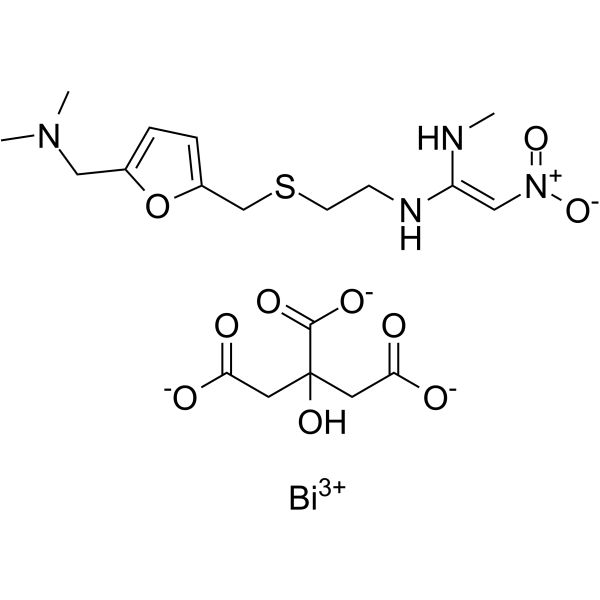128345-62-0
| Name | bismuth,(E)-1-N'-[2-[[5-[(dimethylamino)methyl]furan-2-yl]methylsulfanyl]ethyl]-1-N-methyl-2-nitroethene-1,1-diamine,2-hydroxypropane-1,2,3-tricarboxylate |
|---|---|
| Synonyms |
Azamplus
1,1-ethenediamine, N-[2-[[[5-[(dimethylamino)methyl]-2-furanyl]methyl]thio]ethyl]-N'-methyl-2-nitro-, bismuth(3+) salt, (Z)-, 2-hydroxy-1,2,3-propanetricarboxylate (1:1:1) (salt) 1,1-Ethenediamine, N-[2-[[[5-[(dimethylamino)methyl]-2-furanyl]methyl]thio]ethyl]-N'-methyl-2-nitro-, (Z)-, 2-hydroxy-1,2,3-propanetricarboxylate, bismuth(3+) salt (1:1:1) (salt) Helirad Tritec Bismuth(3+) 2-hydroxy-1,2,3-propanetricarboxylate - (Z)-N-{2-[({5-[(dimethylamino)methyl]-2-furyl}methyl)sulfanyl]ethyl}-N'-methyl-2-nitro-1,1-ethenediamine (1:1:1) Pylorisan 1,1-Ethenediamine, N-[2-[[[5-[(dimethylamino)methyl]-2-furanyl]methyl]thio]ethyl]-N'-methyl-2-nitro-, (E)-, 2-hydroxy-1,2,3-propanetricarboxylate, bismuth(3+) salt (1:1:1) (salt) Pylorid bismuth(3+) 2-hydroxypropane-1,2,3-tricarboxylate - (Z)-N-{2-[({5-[(dimethylamino)methyl]furan-2-yl}methyl)sulfanyl]ethyl}-N'-methyl-2-nitroethene-1,1-diamine (1:1:1) Bismuth(3+) 2-hydroxy-1,2,3-propanetricarboxylate - (E)-N-{2-[({5-[(dimethylamino)methyl]-2-furyl}methyl)sulfanyl]ethyl}-N'-methyl-2-nitro-1,1-ethenediamine (1:1:1) Ranitidine bismuth citrate Elicodil |
| Description | Ranitidine bismuth citrate is an orally active Histamine H2-receptor antagonist with an IC50 of 3.3 μM. Ranitidine bismuth citrate has high selectivity for SARS-CoV-2-infected cells. Ranitidine bismuth citrate is a commonly used agent anti-Helicobacter pylori infection with an MIC90 value of 16 ng/L[1][2][3]. |
|---|---|
| Related Catalog | |
| Target |
IC50: 3.3 μM[1] |
| In Vitro | Ranitidine bismuth citrate (0.1-1 μM, 5 min) is a potent irreversible inhibitor of both the ATPase (IC50=0.69 µM, Ki =0.97 µM ) and DNA-unwinding (IC50 =0.74 µM, Ki =0.39 µM) of the SARS-CoV-2 helicase[2]. Ranitidine bismuth citrate (24 hours) shows potent activity against SARS-CoV-2 with an EC50 value of 2.3 μM in Vero E6 cells[2]. Cell Cytotoxicity Assay[2] Cell Line: Monkey kidney Vero E6 cells, human colorectal Caco-2 cells Concentration: 400-3,740 μM Incubation Time: 48 hours Result: Showed low cytotoxicity with the 50% cytotoxicity concentrations (CC50) ranging from 2.2 mM and 2.5 mM. |
| In Vivo | Ranitidine bismuth citrate (150 mg/kg; intranasally inoculation; once daily; 4 days) suppresses SARS-CoV-2 replication, and relieves virus-associated pneumonia in a golden Syrian hamster model[2]. Ranitidine bismuth citrate (48 mg/kg, i.p.) is effective in eradicating H. pylori and H. mustelae in female ferrests with MIC values of 8 ng/L and 1-2 ng/L, respectively[3]. Ranitidine bismuth citrate (0.1 mg/kg, 0.3 mg/kg; p.o.) is effective in inhibiting gastric acid secretion and (1.0 mM) inhibits human pepsin isoenzymes activity[4]. Animal Model: Male and female Syrian hamsters (6–10 weeks)[1] Dosage: 150 mg/kg Administration: Intranasally inoculation; intraperitoneally given; once daily; 4 days Result: Suppressed SARS-CoV-2 replication, and relieved virus-associated pneumonia in a golden Syrian hamster model. Animal Model: Female Beagle dogs (14-20 kg)[3] Dosage: 0.1 mg/kg Administration: Oral dosed every hour, for 5 hours Result: Inhibited gastric acid secretion. Animal Model: Female, random-bred hooded rats (weight range 90-120 g)[4] Dosage: 0.5 mL/100 g Administration: Pre-treated with indomethacin (5 mg/kg s.c.); oral gavage Result: Inhibited gastric mucosal damage in the rat. |
| References |
| Density | 1.184g/cm3 |
|---|---|
| Boiling Point | 437.1ºC at 760mmHg |
| Molecular Formula | C19H27BiN4O10S |
| Molecular Weight | 712.484 |
| Flash Point | 218.2ºC |
| Exact Mass | 712.125183 |
| PSA | 252.18000 |
| Vapour Pressure | 7.66E-08mmHg at 25°C |
